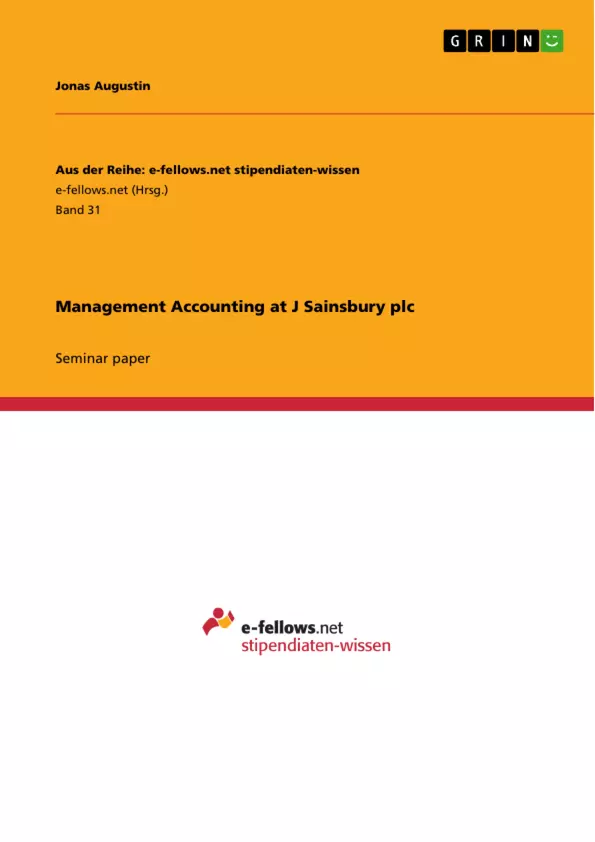J Sainsbury’s plc currently faces tough competition and a clear economic decline. It is therefore essential for the company to review its main internal activities and identify areas of possible savings. This report is designed to analyse management accounting and its importance for J Sainsbury’s plc and to propose priorities for spending on management accounting in the context of the current market situation and the company’s three-year targets of the ‘from recovery to growth’ plan. Firstly, we will compare management accounting and financial accounting and then briefly outline the merits and disadvantages of management accounting to J Sainsbury plc. With this theoretical background, the report identifies three major areas of management accounting for prioritisation based on a fundamental analysis of J Sainsbury’s main activities and goals.
Inhaltsverzeichnis (Table of Contents)
- Executive Summary
- Introduction
- Management Accounting versus Financial Accounting
- Merits and Disadvantages of Management Accounting
- Priorities in Management Accounting for J Sainsbury plc
- Costing
- Management of Working Capital
- Budgeting
- Conclusion
Zielsetzung und Themenschwerpunkte (Objectives and Key Themes)
This report aims to analyze management accounting and its significance for J Sainsbury plc, proposing priorities for management accounting expenditures within the current market context and the company's three-year goals outlined in the "from recovery to growth" plan. It compares management and financial accounting, explores the merits and disadvantages of management accounting for J Sainsbury plc, and identifies three key areas for prioritization in management accounting based on a fundamental analysis of the company's activities and goals.
- The importance of management accounting in supporting managerial decision-making processes.
- The challenges and opportunities presented by management accounting for J Sainsbury plc in a competitive and declining economic environment.
- The critical role of costing, working capital management, and budgeting in achieving the company's "from recovery to growth" goals.
- The need for effective management accounting practices to ensure competitive pricing, cost optimization, and employee motivation.
Zusammenfassung der Kapitel (Chapter Summaries)
The report begins by introducing the context of J Sainsbury plc's current challenges and the need for internal improvements. It then distinguishes between management accounting and financial accounting, highlighting their differences in legal requirements, reporting focus, detail level, time dimension, and information quality. This provides a theoretical framework for understanding the role of management accounting in supporting J Sainsbury plc's decision-making processes. The report further discusses the merits and disadvantages of management accounting, emphasizing its potential to provide valuable information for decision-making while acknowledging the high cost and potential for inaccuracies.
The report then identifies three key areas for prioritization in management accounting: costing, working capital management, and budgeting. It highlights the importance of an effective costing system to ensure competitive pricing, the potential for cost savings in inventory management, and the role of budgeting in performance measurement and employee motivation. The report concludes with a discussion of how these three areas, if effectively implemented, can contribute to the achievement of J Sainsbury plc's goals and its overall growth.
Schlüsselwörter (Keywords)
The core concepts and key themes explored in this report include management accounting, financial accounting, cost accounting, activity-based costing (ABC), working capital management, inventory management, budgeting, performance measurement, employee motivation, competitive pricing, and the "from recovery to growth" plan. These concepts are central to understanding the challenges and opportunities faced by J Sainsbury plc in a competitive market environment and the role of management accounting in supporting the company's strategic objectives.
- Quote paper
- Jonas Augustin (Author), 2008, Management Accounting at J Sainsbury plc, Munich, GRIN Verlag, https://www.grin.com/document/174203



